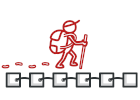
Iterator in Python
Iterator is a behavioral design pattern that allows sequential traversal through a complex data structure without exposing its internal details.
Thanks to the Iterator, clients can go over elements of different collections in a similar fashion using a single iterator interface.
Complexity:
Popularity:
Usage examples: The pattern is very common in Python code. Many frameworks and libraries use it to provide a standard way for traversing their collections.
Identification: Iterator is easy to recognize by the navigation methods (such as next, previous and others). Client code that uses iterators might not have direct access to the collection being traversed.
Conceptual Example
This example illustrates the structure of the Iterator design pattern. It focuses on answering these questions:
- What classes does it consist of?
- What roles do these classes play?
- In what way the elements of the pattern are related?
main.py: Conceptual example
from __future__ import annotations
from collections.abc import Iterable, Iterator
from typing import Any
"""
To create an iterator in Python, there are two abstract classes from the built-
in `collections` module - Iterable,Iterator. We need to implement the
`__iter__()` method in the iterated object (collection), and the `__next__ ()`
method in theiterator.
"""
class AlphabeticalOrderIterator(Iterator):
"""
Concrete Iterators implement various traversal algorithms. These classes
store the current traversal position at all times.
"""
"""
`_position` attribute stores the current traversal position. An iterator may
have a lot of other fields for storing iteration state, especially when it
is supposed to work with a particular kind of collection.
"""
_position: int = None
"""
This attribute indicates the traversal direction.
"""
_reverse: bool = False
def __init__(self, collection: WordsCollection, reverse: bool = False) -> None:
self._collection = collection
self._reverse = reverse
self._sorted_items = None # Will be set on first __next__ call
self._position = 0
def __next__(self) -> Any:
"""
Optimization: sorting happens only when the first items is actually
requested.
"""
if self._sorted_items is None:
self._sorted_items = sorted(self._collection._collection)
if self._reverse:
self._sorted_items = list(reversed(self._sorted_items))
"""
The __next__() method must return the next item in the sequence. On
reaching the end, and in subsequent calls, it must raise StopIteration.
"""
if self._position >= len(self._sorted_items):
raise StopIteration()
value = self._sorted_items[self._position]
self._position += 1
return value
class WordsCollection(Iterable):
"""
Concrete Collections provide one or several methods for retrieving fresh
iterator instances, compatible with the collection class.
"""
def __init__(self, collection: list[Any] | None = None) -> None:
self._collection = collection or []
def __getitem__(self, index: int) -> Any:
return self._collection[index]
def __iter__(self) -> AlphabeticalOrderIterator:
"""
The __iter__() method returns the iterator object itself, by default we
return the iterator in ascending order.
"""
return AlphabeticalOrderIterator(self)
def get_reverse_iterator(self) -> AlphabeticalOrderIterator:
return AlphabeticalOrderIterator(self, True)
def add_item(self, item: Any) -> None:
self._collection.append(item)
if __name__ == "__main__":
# The client code may or may not know about the Concrete Iterator or
# Collection classes, depending on the level of indirection you want to keep
# in your program.
collection = WordsCollection()
collection.add_item("B")
collection.add_item("A")
collection.add_item("C")
print("Straight traversal:")
print("\n".join(collection))
print("")
print("Reverse traversal:")
print("\n".join(collection.get_reverse_iterator()), end="")
Output.txt: Execution result
Straight traversal:
A
B
C
Reverse traversal:
C
B
A
 LAST DAYS OF THE WINTER SALE!
LAST DAYS OF THE WINTER SALE!
